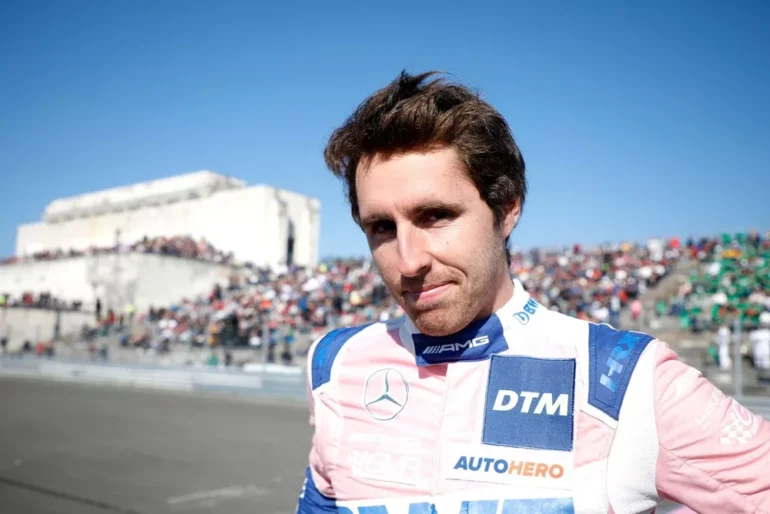GT racing star Daniel Juncadella has opened up about the detrimental impact that the politics of the DTM had on his career, revealing that it “destroyed his career in a way.”
Juncadella was part of Mercedes’ factory programme in the DTM for five seasons between 2013 and 2018, initially racing for Mucke Motorsport before moving to HWA. During this period, manufacturers wielded significant influence over their teams and drivers, with Mercedes, BMW, and Audi putting their weight behind drivers they believed had the best chance at winning the championship. This often left other drivers in a supporting role, and Juncadella admitted that this approach left a sour taste in his mouth.
“The politics in the DTM destroyed my career in a way,” Juncadella reflected in a podcast hosted by fellow drivers Laurens and Dries Vanthoor. “I never really understood why some decisions were made in one way or the other and for five years, I had no results. You can be very good, you can do good in many aspects, but if the results are not coming, it just breaks you.”
Juncadella explained how his time in the DTM, despite his efforts, resulted in no significant progress, which greatly affected his confidence. He spent five seasons in the series without managing to achieve the results he felt he deserved, with a single victory and his best finish being 15th in the standings.
After a series of up-and-down years, Juncadella decided to start working with a sports psychologist in 2018, which he cited as a significant turning point in his career. “Since 2018, which is quite late in my career, I started working with a sports psychologist and focused on these things,” he said. “That was a big turning point in my career because my career has been a bit up and down in many, many years.”
The emotional toll that his lack of results in DTM had taken on him led him to seek help to rebuild his confidence and change his mindset. “When I started working with a sports psychologist, it changed my perception a lot on how to deal with the lack of confidence,” he added.
Prior to his DTM career, Juncadella had enjoyed success, winning the 2012 Euro Formula 3 title as a Mercedes junior. He had originally planned to step up to GP2 (now F2) with Rapax the following year, but sponsorship delays forced him to abandon those plans and instead accept the DTM offer from Mercedes.
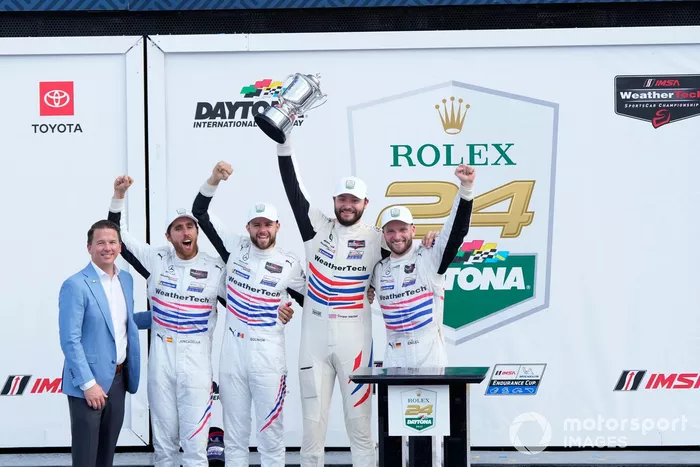
Despite his early promise, his time in the DTM was marked by frustration, as Juncadella felt that he was never given a fair opportunity to prove himself, leading to his struggles with confidence and results. Today, Juncadella has gone on to establish himself as one of the top GT drivers, with victories in prestigious races such as the Spa 24 Hours, Daytona 24 Hours, and Petit Le Mans.
Daniel Juncadella, reflecting on the early years of his professional racing career, revealed just how mentally taxing his time in the DTM was, eventually prompting him to seek help from a sports psychologist.
“Since 2018, which is quite late in my career, I started working with a sports psychologist and focused on these things,” Juncadella shared in a podcast hosted by fellow drivers Laurens and Dries Vanthoor. “That was a big turning point in my career because my career has been a bit up and down in many, many years.”
Juncadella had an impressive start to his racing career, winning the 2012 Euro Formula 3 title as a Mercedes junior and looking to step up to GP2. However, delays in sponsorship forced him to abandon his plans and instead take up an offer from Mercedes to race in the DTM.
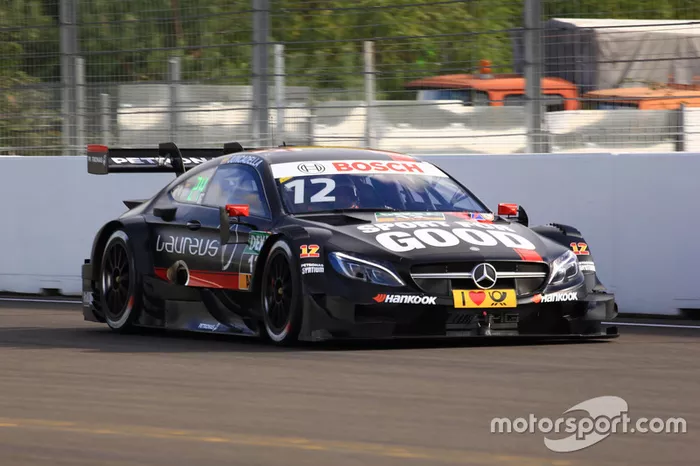
Unfortunately, his time in the series was fraught with frustration. Despite his talent and potential, Juncadella struggled to achieve results, managing just one win and finishing only 15th in the standings during his five-year stint with Mercedes. He explained how the politics of DTM created a toxic environment for him, saying, “DTM also destroyed my career in a way with politics. I never really understood why some decisions were made in one way or the other and for five years I had no results. You can be very good, you can do good in many aspects, but if the results are not coming, it just breaks you.”
This emotional toll impacted Juncadella both on and off the track. In 2014, while serving as a reserve driver for Force India in Formula 1, he famously crashed during a practice session at the Brazilian Grand Prix, causing regular driver Sergio Perez to miss an entire day of running. Reflecting on this, Juncadella admitted that the pressure he was under during his DTM years had left him mentally “destroyed.” He added, “I could not deal with it.”
The frustration of feeling like he was never given a fair chance in the DTM weighed heavily on him, particularly in his time with Mercedes. Juncadella recalled the early days of the 2015 season when Mercedes had already made decisions about his future, even before the first race of the year had started. “We had a team-building day together somewhere in Germany on a boat in a lake, together with the team owner, team manager, and the engineers,” he said. “We had these team-building moments, and you could just tell that they had already made decisions. It was clear what was going to happen.”
Mercedes’ decision to promote Pascal Wehrlein, another one of its junior drivers, to a full-time seat at Mucke Motorsport in 2015 seemed to confirm Juncadella’s fears. “They promoted Pascal Wehrlein, my former F3 rival, and that created a team of two promising young talents,” he recalled. “But I knew that Mercedes had already decided what would happen before the start of the season.”
Ultimately, Juncadella’s DTM career became a source of immense frustration, as he felt stifled by politics and team dynamics beyond his control. “When I hear the word DTM, I’m already panicking,” he admitted. “I don’t even want to hear it anymore.”
Despite these challenges, Juncadella is now content with where his career has taken him, establishing himself as one of the top drivers in GT racing, with victories in prestigious events like the Spa 24 Hours, Daytona 24 Hours, and Petit Le Mans. Through his work with a sports psychologist, Juncadella was able to regain his confidence and shift his perspective, ultimately finding success outside of the DTM.
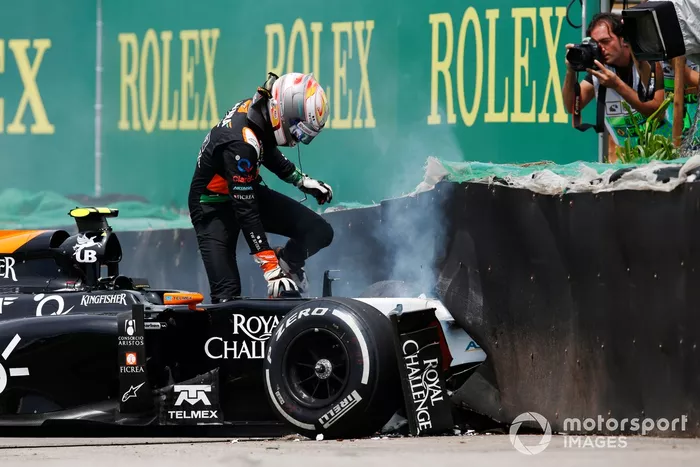
Daniel Juncadella, reflecting on the early years of his professional racing career, revealed just how mentally taxing his time in the DTM was, eventually prompting him to seek help from a sports psychologist.
“Since 2018, which is quite late in my career, I started working with a sports psychologist and focused on these things,” Juncadella shared in a podcast hosted by fellow drivers Laurens and Dries Vanthoor. “That was a big turning point in my career because my career has been a bit up and down in many, many years.”
Juncadella had an impressive start to his racing career, winning the 2012 Euro Formula 3 title as a Mercedes junior and looking to step up to GP2. However, delays in sponsorship forced him to abandon his plans and instead take up an offer from Mercedes to race in the DTM.
Unfortunately, his time in the series was fraught with frustration. Despite his talent and potential, Juncadella struggled to achieve results, managing just one win and finishing only 15th in the standings during his five-year stint with Mercedes. He explained how the politics of DTM created a toxic environment for him, saying, “DTM also destroyed my career in a way with politics. I never really understood why some decisions were made in one way or the other and for five years I had no results. You can be very good, you can do good in many aspects, but if the results are not coming, it just breaks you.”
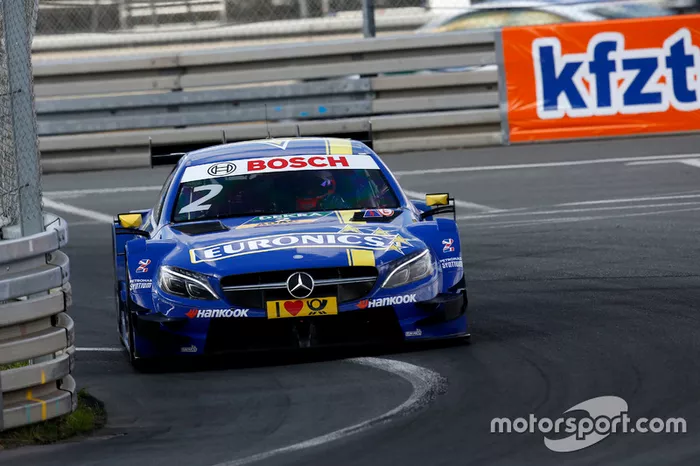
This emotional toll impacted Juncadella both on and off the track. In 2014, while serving as a reserve driver for Force India in Formula 1, he famously crashed during a practice session at the Brazilian Grand Prix, causing regular driver Sergio Perez to miss an entire day of running. Reflecting on this, Juncadella admitted that the pressure he was under during his DTM years had left him mentally “destroyed.” He added, “I could not deal with it.”
The frustration of feeling like he was never given a fair chance in the DTM weighed heavily on him, particularly in his time with Mercedes. Juncadella recalled the early days of the 2015 season when Mercedes had already made decisions about his future, even before the first race of the year had started. “We had a team-building day together somewhere in Germany on a boat in a lake, together with the team owner, team manager, and the engineers,” he said. “We had these team-building moments, and you could just tell that they had already made decisions. It was clear what was going to happen.”
Mercedes’ decision to promote Pascal Wehrlein, another one of its junior drivers, to a full-time seat at Mucke Motorsport in 2015 seemed to confirm Juncadella’s fears. “They promoted Pascal Wehrlein, my former F3 rival, and that created a team of two promising young talents,” he recalled. “But I knew that Mercedes had already decided what would happen before the start of the season.”
Ultimately, Juncadella’s DTM career became a source of immense frustration, as he felt stifled by politics and team dynamics beyond his control. “When I hear the word DTM, I’m already panicking,” he admitted. “I don’t even want to hear it anymore.”
Despite these challenges, Juncadella is now content with where his career has taken him, establishing himself as one of the top drivers in GT racing, with victories in prestigious events like the Spa 24 Hours, Daytona 24 Hours, and Petit Le Mans. Through his work with a sports psychologist, Juncadella was able to regain his confidence and shift his perspective, ultimately finding success outside of the DTM.

